
Allergy shots is also called immunotherapy. This helps your body get used to allergens (things that trigger an allergic reaction). They aren’t a cure, but it relieves your symptoms and you may not have experience it often.
Allergy shots may be a good treatment choice for you if:
Allergy shots can be used to control symptoms triggered by:
Allergy shots aren’t available for food allergies or chronic hives (urticaria).
How Often Do You Get Allergy Shots?
You should go to your doctor once or twice a week for several months. The shot that is given to you contains a tiny amount of the thing you’re allergic to (pollen, pet dander, mold, dust mites, or bee venom). Gradually, the dose will go up until to its so-called maintenance dose. After that, you’ll usually get a shot every 2-4 weeks for 4-5 months. Then your doctor will gradually increase the time between shots until you’re getting them about once a month for 3-5 years. Your allergy symptoms during that time will get better and may even go away.
How Should I Prepare for Allergy Shots?
Avoid exercise or doing anything strenuous for 2 hours before and after your appointment. Exercise boosts blood flow to the tissues and may cause the allergens to spread throughout your body faster. It’s not likely to cause a serious problem, but it’s best to be safe.
Tell your doctor about any other medicines or herbs and supplements you take. The products you are taking may interact with the treatment or raise the risk of side effects. You may need to stop allergy shots if you take these medications.
Ask your doctor whether you should continue to get allergy shots if you’re pregnant or planning to get pregnant.
What Should I Expect Afterward?
30 minutes after you get an allergy shot, you need to stay at the doctor’s office to make sure you don’t get side effects such as itchy eyes, shortness of breath, a runny nose, or a tight throat. If you get these symptoms after you leave, go back to your doctor’s office or to the nearest emergency room.
Redness, swelling, or irritation right around the site of the injection is normal. These symptoms should go away in 4 to 8 hours.
What Is Rush Immunotherapy?
Rush Immunotherapy is the faster way to get to a maintenance dose. However, it has high risk.
You get doses of the allergen every day instead of every few days on the first part of the treatment. Your doctor will check on you closely, in case you have a bad reaction. In some cases, you may get medicine before you get the dose of the allergen, to help prevent a reaction.
Who Should Not Get Allergy Shots?
These would increase the risk for people with heart or lung disease, or who take certain medications. Tell your allergist about your health and any medicines you take, so you can decide if allergy shots are right for you.
Overview and FactsTypes and SymptomsDiagnosis & MedicationsOverview and Facts Referred pain is a phenomenon where pain is perceived at a [...]
Overview and FactsTypes and SymptomsDiagnosis & MedicationsOverview and Facts Quinoline yellow is a synthetic food colorant commonly used in the [...]
Overview and FactsTypes and SymptomsDiagnosis & MedicationsOverview and Facts Pneumothorax is a condition characterized by the presence of air in [...]